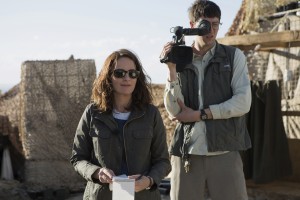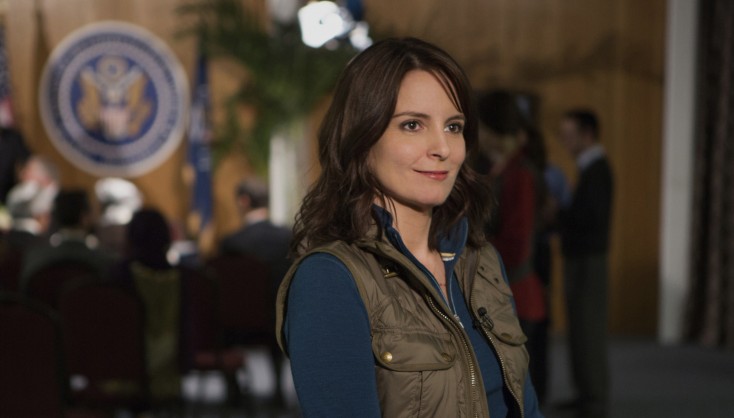
Left to right: Tina Fey plays Kim Baker and Nicholas Braun plays Tall Brian in WHISKEY TANGO FOXTROT. ©Paramount Pictures. CR: Frank Masi.
By ANGELA DAWSON
Front Row Features
NEW YORK—Tina Fey plays a cable TV news producer that takes on a dangerous assignment in Afghanistan in order to shake up her personal and professional life, both of which have become routine, in the war comedy “Whiskey Tango Foxtrot.” She’s also one of the film’s producers.
The film is based on real life war reporter Kim Barker’s autobiography, “The Taliban Shuffle: Strange Days in Afghanistan and Pakistan.” Glenn Ficarra and John Requa (“I Love You Philip Morris”) directed the dramedy from a screenplay by Robert Carlock (TV’s “Unbreakable Kimmy Schmidt”) .
The 45-year-old comedian is best known for lighter comedies including “Baby Mama,” “Sisters” and NBC’s “30 Rock.”And although “Whiskey Tango Foxtrot”—military code for “WTF,” which has another connotation—has humor in it, it also delves into the serious subject of warfare. Fey leads an all-star cast including Margot Robbie, Martin Freeman, Alfred Molina and Billy Bob Thornton. In reality, Barker was a print reporter for the Chicago Tribune; the filmmakers changed the character’s job in the film to TV correspondent for dramatic purposes. (They also slightly altered her last name.)
Fey spoke at a press conference about her experience portraying a real life war correspondent and venturing into more serious subject matter.
Q: How did you find out about this story?
Fey: First, I found out about the book. I think it was the New York Times review where the journalist said, “This is like a Tina Fey character,” and because I’m an egomaniac and a moron, that really spoke to me. I got a hold of the book that way. Loved the book. For me, when you look at something like that, when you read a book for enjoyment, it’s one thing. When you read a book also thinking, “Could this be a movie?” (and) see things, events, moments that, to me, were so fascinating and strange and funny and cinematic, it’s great, so I was hopeful. I definitely thought it really should be a movie, and so I took it to Lorne Michaels and to Robert (Carlock), who I thought would be really well qualified to try to adapt it.
Q: Was it scary for you to know that this role had quite a bit of drama in it and that there wouldn’t be a joke waiting for you at the end of a line of dialogue?
Fey: The book is funny and I think no life experience is wholly dramatic. In real life, people in the most dire situations must cope through humor and find humor in these things, and so I thought there was a real honesty that way in the book. The hope is that you try to perform honestly and whether there are jokes or not, it will be fine.
Q: War comedies have been a nearly dead genre despite our country being at war now for quite some time. What were the challenges of making a movie with humor and heart that is set in a war zone? There are obvious comparisons to classic war comedies like “M*A*S*H.”
Fey: Right, there actually are so many great war comedies. This movie, at its core, is a human story. It’s about relationships; it’s not political. It’s not “Dr. Strangelove.” It’s about a woman who is sort of making a choice to blow up her existing life and go on this “adventure,” for lack of a better word. For me, it was about these people in these relationships. Maybe it was just not knowing better to know that this is a genre we weren’t supposed to be trying to touch. It didn’t seem hard at all until now, when you go to try to sell it to people. Like, maybe we should say (in our advertising) that the vehicles transform to robots and then they fight each other. Then they’re going to be halfway through the film before they realize that that didn’t actually happen.
Q: How was it playing the principal character and producing the project at the same time?
Fey: To be a producer at the same time you have to work with people that you trust and who are doing their jobs well enough that you’re just trying to think about what you have to do that day and not be like, “How many pages we got today?” With a film, you hire directors to make their movie. It’s their movie more than anyone else’s, once you’re there on the day. That’s OK. That’s easy to do.
Q: What kind of responsibility did you feel you had to do with portraying a real person versus anything else you’ve done previously, outside of maybe Sarah Palin?
Fey: My Kim impression is unbelievably good. (She chuckles.) Once you are allowing your story to be adapted in this way, you have to be willing to let go and say, “Oh, these two people that are both very dear to me are going to be one person.” Even the shift of making her a television reporter as opposed to a print reporter—those were things that are just are more cinematic. Mostly I just wanted Kim to not be mad about the movie, but other that that, this isn’t a case where I was trying to be taller or sound exactly like her, but to try to find the spirit of it.
Q: Do you think the movie gives a bleak view of what it takes for a woman to be a war zone reporter?
Fey: I don’t think so. I think it points out how there are some real absurdities to it, especially in that part of the world, You could be doing your job and someone could just full tilt grab your ***, and it’s not that weird. But I don’t think it’s so bleak, because it wasn’t like anyone was afraid to send her there, or didn’t want her stories because she’s a woman. It just was a weird situation.
Q: I enjoyed the scene between you and Christopher Abbott, who plays Fahim, the fixer who helps you in Afghanistan, where you guys sort of go your separate ways, and he was pretty much implying that you’re getting very high off the idea of living this life of constant danger. What was shooting that scene like, and at some point did Kim finally realize that Fahim was right?
Fey: Yes, I think she definitely does. In that moment, she’s sort of suspecting that he’s right. A scene like that is a pleasure to shoot because I knew that Robert (Carlock, the screenwriter) had written this beautiful monologue for Chris, and Chris is so good. As the other actor in that scene, all I had to do was listen to him and react to him. He’s doing such beautiful work and the words are so great that it was a great scene to shoot for me, because he’s doing all the heavy lifting and doing such a good job. I think it’s one of my favorite scenes in the movie. It really is sort of summing up a lot of what the whole movie is about. He’s telling me, “You’re getting addicted to this lifestyle and it’s dangerous and I don’t want to be a part of this anymore.”
Q: Is there anything about living an actor’s life that you feel is a lot of fun, but also could be addictive and possibly dangerous?
Fey: Yeah, but I think for actors, it’s so much smaller a scale and so much less important. Like, sometimes you think, “I’m in the middle of this project so I can’t go to my cousin’s wedding.” I kind of get addicted to that feeling of, “I’m just very special, important right now.”
Q: The movie has some interesting things to say about being a Western woman in the Middle East. There’s that line about, “Now you’re in the purple prison” when you put on the burka. Could you speak about that?
Fey: We did not really travel to Asia or to the Middle East at all, so we are just sort of guessing what it felt like. I’m always fascinated with journalists who go, “OK, I’m going to play along and I’m going to wear the headscarf on the news.”
Q: What was the most challenging thing to play your character from a personal level?
Fey: For me, the most challenging thing, personally, was trying to pretend we were there, to really try to imagine the feeling of danger, because we were in New Mexico. We were in the United States. Everything else was there for us. The words were there. The characters were so well drawn.
Q: Kim Barker wrote about this code of silence for female journalists when encountering sexual harassment. The film kind of touches on that, too. Have you noticed that in the entertainment industry as well?
Fey: We (actresses in the film were) lucky to be born here. Mild complaints in the U.S. We’re very lucky.
Q: Has doing this project changed your viewpoint on political comedy and how you approach it?
Fey: I don’t think of this movie as political comedy particularly, because it’s a more human story than that. The same things apply, that you want to try to get the facts and background right, whether it’s a political sketch or this movie and you want to feel that any observations or jokes you are making are what we would call a fair hit, and that they ring true in some way. Beyond that, it is what it is.
Q: Can you talk about working with your cast mates?
Fey: It was just so educational to get to work with Martin (Freeman), Alfred (Molina), Billy Bob (Thornton) and Margot (Robbie). These are people that I really admire in other roles. You just try to keep up with them. It’s like playing tennis with someone who’s a much better tennis player. You just hope that your game comes up a little bit.



